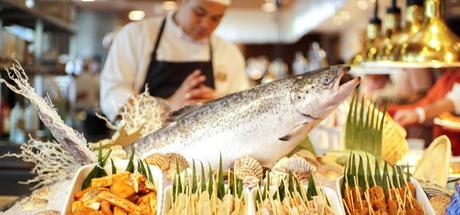
One thing many people look forward to when traveling to tropical and beach destinations is the fresh food they'll be able to indulge in. Even better, most of these fresh fruits, vegetables and fish are healthy, so there's no post-meal guilt.
While fish tends to be a healthy source of protein and omega-3 fatty acids, it may pose a risk to your health if you're traveling. Here's what you need to know about the most common types of fish poisoning and how you can avoid it while abroad.
Ciguatera Fish Poisoning
Although nearly anyone is susceptible to ciguatera, travelers have a higher risk. This illness is caused by consuming fish that have been contaminated with toxins produced by microorganisms that live around coral reefs. What happens is that small fish eat these microorganisms, large fish eat the small fish and then humans eat the large fish where the toxins have become concentrated.
Fish gets shipped around the world for our consumption, which means ciguatera can happen anywhere. But the risk is highest in fish from the Caribbean Sea, Pacific Ocean and Indian Ocean. According to the Centers for Disease Control and Prevention (CDC), as many as three percent of people who travel to these areas get ciguatera.
Ciguatera is most commonly caused by eating barracuda, grouper, moray eel, amberjack, sea bass, sturgeon, parrotfish, surgeonfish and red snapper.
If you've eaten contaminated fish, symptoms of ciguatera typically will develop one to three hours after eating the fish. These symptoms can include nausea, vomiting, diarrhea and stomach pain. Some people may even experience neurologic symptoms, like a tingling sensation, tooth pain, feeling as though teeth are loose or itchy, a metallic taste in the mouth or blurred vision.
Currently, there is no treatment for ciguatera and, unfortunately, the toxins that cause ciguatera aren't destroyed by cooking. So the best way to avoid getting sick is to avoid these types fish while traveling, especially barracuda and moray eel. You should also avoid eating the fish's organs, as this is where the highest concentration of the toxins are.
Scombroid Fish Poisoning
Eating fish may also cause you to become sick with scombroid, which is caused by eating fish that hasn't been refrigerated or preserved properly. When fish have naturally high levels of the amino acid histidine, bacteria turn that amino acid into histamine when it's not properly stored. People become sick when the fish contains high levels of histamine.
Scombroid happens around the world, but it's something to be especially mindful of if you're traveling somewhere with lower food preparation standards than the U.S. Fish needs to be iced, refrigerated or frozen immediately after it's caught. The types of fish are most commonly associated with scombroid include tuna, mackerel, mahi-mahi, sardines, anchovies, herring, bluefish, amberjack and marlin.
If you've eaten a contaminated fish, the symptoms of scombroid appear within a few minutes to an hour after eating. And these symptoms are far from pleasant-they are similar to an allergic reaction, including a headache, a flush face, itching, heart palpitations, blurred vision, cramps and diarrhea.
This is a tricky illness to avoid-contaminated fish may taste peppery, sharp, metallic or bitter, but it may also look and taste completely normal.
But the good news is that scombroid can be treated with antihistamines and, even without treatment, people usually get better within 12 hours.
When it comes to traveling abroad, the last thing you want is food poisoning. So it's best to pay attention to what you're eating to best avoid a risk of illness.

